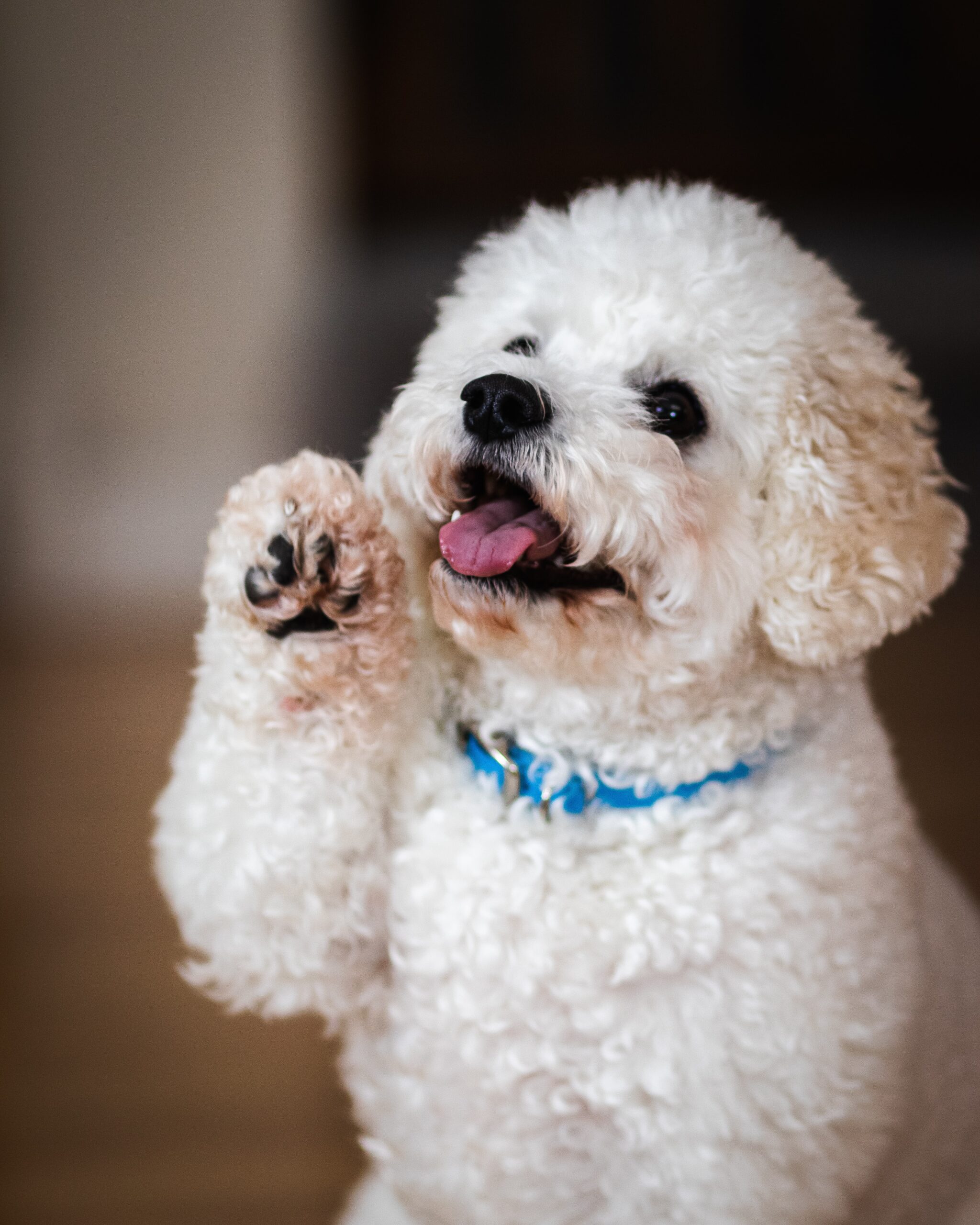If you think all dogs look alike, try getting up close and personal with a poodle. Most people find them adorable; others see their big round eyes staring blankly ahead, as if they’d rather be anywhere else but here. But no matter what kind of personality trait is driving this stare, there can only be one reason why someone would get a poodle in the first place: The little ball of fluff makes a great companion, and great companions deserve to live up to their potential, so lets find out how to train a Poodle!
A gentle giant by nature, the poodle has earned its reputation thanks to centuries of breeding for beauty and intelligence. This breed was originally bred specifically as royalty’s lapdogs, since they were known to sleep on cushions while their owners entertained guests. In fact, the word “poodle” comes from the French phrase le gout du peuple, meaning the taste of the masses, which refers to how these animals were perceived during the reign of Louis XIV. While many other purebred dogs may come across as snobby, cocky or even aloof, poodles tend to exude loyalty and friendliness just naturally. Their calm demeanor helps make them popular among children too young to understand the rules of etiquette when interacting with strangers. And because they love being cuddled, most poodles will follow you everywhere you go.
The standard poodle isn’t quite miniature compared to other larger breeds like Great Danes or Saint Bernards. Standing about 22 inches tall at the shoulder and weighing between 65-85 pounds, this graceful canine usually looks more like a stuffed toy than a real live pup. Despite their diminutive size though, poodles still need plenty of exercise and mental stimulation every day — so much so that some experts say they should never be left alone for long periods of time. With such a high energy level, however, it’s important not to overwork your new buddy. Exercise stimulates brain activity as well. So let him burn off his excess steam once he’s tired enough from playtime. Playing with poodles is a huge part of how to train a poodle properly.
But before we move onto the next portion, take note of our tips concerning proper care and nutrition for poodles. We’ll discuss everything from grooming to diet, in addition to helpful hints for training this lovable furball.
Grooming Your New Poodle Best Friend
Because poodles are relatively short haired, brushing them regularly is sufficient maintenance for keeping them clean. However, given their large ears and nose area, extra attention must be paid to prevent bacteria buildup. To keep odor down, use specially formulated shampoo made especially for pets, making sure to rinse thoroughly after bathing. For added protection against disease, trim any hair growing inside your home’s entryway using scissors or clippers. Also be sure to wash your hands thoroughly whenever you touch anything furry or smelly (including your pet).
Just like humans, poodles require regular haircuts. A good haircut will help maintain healthy skin and cut away unsightly mats underfoot. Use scissors or a comb to remove stray hairs near the tail, hindquarters and rear end of your poodle. Once trimmed, run fingers gently through each patch to check for tangles. Be careful not to pull out loose hairs, as doing so could cause ingrown hairs, infections and rashes. You can also purchase special combs designed to clip unwanted hairs, although these tools aren’t necessary as often as normal brushing.
When cutting your poodle’s nails, start with a nail nubbin or piece of dental floss. Gently work your way down each toe until you reach the tip of the claw. Then insert the tool into the hole and slowly slide it back toward the base of each toe. Next, turn the tool clockwise several times until you encounter bone. Finally, continue working counterclockwise along the top side edges of each footpad, stopping occasionally to wipe away sweat and dirt. Don’t forget to check underneath! Nails can become infected easily without daily cleaning, causing pain and possible scarring. Cleaning them yourself may save money in vet bills later on. Cleaning is a huge part of how to train a poodle.
Now that you know how to properly groom your new best friend, read on to learn how to teach him where his food plate goes.
Teaching Your Dog Some Basic Tricks – How to train a poodle
Your new best friend needs a lot of guidance throughout life, including teaching him where to eat and drink, whether he wants to stay indoors or outside, and how to behave around other animals. This is why it’s important to know how to train a poodle. As with human toddlers, patience is key when teaching your poodle basic skills. Start early with positive reinforcement methods like praise, treats and verbal encouragement. Because poodles can pick up bad habits quickly, don’t allow them to roam free until you feel confident they won’t chew shoes, jump on guests or otherwise frighten visitors.
First things first: Make sure everyone knows your poodle’s name. After greeting guests appropriately, give him a command like sit, lie down or wait patiently for him to respond. When he does, immediately reward him with lots of affection and praise. Never yell or hit your poodle, since this will confuse him and eventually lead to behavioral problems. Instead, encourage him to perform tricks like jumping through rings or catching a treat tossed nearby. Praise him lavishly anytime he completes tasks successfully. Soon, he’ll begin showing signs of obedience… er, learning?
Dogs generally enjoy spending time outdoors, but remember to supervise outdoor outings carefully. Take walks together and watch for dangers like cars, bicycles or joggers running closely behind. Don’t leave your pet unattended, either, due to possible theft. Keep a leash handy and secure it tightly.

Some general how to train a poodle tips
1) Positive Reinforcement Training Methods — First, establish household rules. Tell your poodle firmly that chewing shoes, jumping on guests and barking/growling at other animals are unacceptable behavior. Reward appropriate actions with praise and hugs. Teach commands like sit, lay down and heel by giving clear directions and reinforcing compliance with rewards. Don’t speak harshly or raise voice when correcting inappropriate behaviors.
2) Reward System — Set up a system of rewarding appropriate behavior based upon specific commands. For example, instruct your poodle to sit when eating and praising him when he does demonstrates proper manners. Give him treats when he sits quietly and ignores requests to bark, whine or cry. Since your poodle learns best through repetition, practice sessions are essential.
3) Trick & Command Method — Develop trick and command combinations to reinforce learned responses. For instance, show the “sit-stay” command by placing food on the floor and encouraging your poodle to sit while he waits to receive his share of the meal. He’ll soon associate sitting with permission to eat.
4) Basic Obedience Training Techniques — Begin with simple exercises like staying and coming back repeatedly. Practice walking calmly beside your poodle on a tightrope or narrow walkway. Encourage him to do the same by offering him treats and saying words like “walk,” “nice” and “good.” Gradually increase distance and speed as your poodle becomes familiar with walking alongside you. Always greet your new pal with enthusiasm and reassurance.
5) Sit, Stay & Lay Down – One of the easiest ways to teach your poodle basic obedience is to create routines. Establish patterns for feeding, drinking water, going outside and sleeping. Invite your poodle to participate by asking questions like “Do you want your blanket?” or “Would you like to finish your dinner now?”. Praise him enthusiastically whenever he complies. Eventually, he’ll recognize the pattern and automatically comply with instructions.
6) Come Walk Me – Another effective method is to lure your poodle towards you with tasty treats or toys. Slowly guide him forward by extending arms and leading him on a path with repeated movements. Whenever you notice him veering off course, stop abruptly and redirect him back to your original point of interest. Repeat steps until he begins following willingly.
7) Wait Until Hungry – Sometimes, your poodle can determine exactly when he feels hungry simply by watching you eat. Rather than rushing through meals, offer him scraps of meat, vegetables and dessert periodically. By waiting until he signals hunger with eagerness, you’ll avoid overeating and spoil your pet’s appetite.
8) Separation Anxiety – Dogs exhibit separation anxiety when confined or isolated for extended periods of time. Help alleviate his stress levels by visiting frequently and playing games with him. Talk softly to him, reassure him and sing happy songs. During stressful situations, provide distractions such as music, TV shows, books, newspapers or other objects to focus upon.
9) Crate Confinement – Place your poodle in his crate overnight or whenever he displays destructive chewing habits. Crates can effectively act as confinement devices, allowing your poodle to spend less time roaming freely and freeing you from worry when guests arrive unexpectedly.
10) Housebreaking Issues – Avoid accidents by picking up your poodle’s feces and urine right away. Put litter boxes within sight of doorways into rooms where you expect him to eliminate. Remove his favorite blankets, beds and pillows to discourage digging. Sprinkle newspaper floors with potpourri or baby powder to deter marking. Change bedding twice weekly, ideally

Leave a Reply